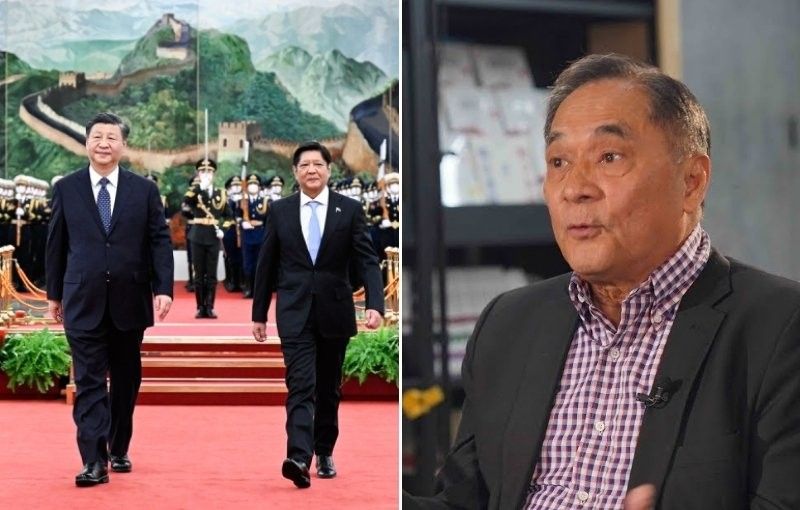From Exile to Ambassador: How Philippines' Jaime Florcruz sees China's future

MANILA, Philippines — He fought the Marcos dictatorship in his youth and spent years exiled in China.
Today, the Philippine envoy to Beijing, who President Ferdinand Marcos Jr. appointed in 2022, is perhaps one of the only few China watchers in the region who sees the potential for a "benign and open" Beijing to emerge in the future.
Jaime FlorCruz has spent five decades in China after arriving there as a student in 1971. In his September 17 interview with The Economist, the veteran China observer charted the country's history, examined the complicated legacy of its one-party rule, and expressed hope that Beijing will not strong-arm neighbors into its influence as it gains power.
"I don’t know what a strong China will actually be like in the next few years. What I know is that a weak China, as I saw 50 years ago, was bad for its neighbors," he said.
"That’s the worst of the options that I can think of."
Economic upheaval
FlorCruz' beliefs about the future of China are grounded in his long stay in the country — a story that started with being threatened with arrest by the government of the current president's father.
His open-ended political exile started after being blacklisted by the Marcos Sr. administration while he was on a study tour in China, which kept him from returning to the Philippines for a decade. FlorCruz found himself in the middle of Mao Zedong's Cultural Revolution and spent years on physical labor on a farm and on a ship before getting to study history in one of the country's top schools.
It was in university that FlorCruz said he learned that his classmates — some of whom went to assume top posts in the Chinese Communist Party — had mixed views on the political and social upheaval launched by Mao in his last decade in power.
"The official view was that Mao was 70% correct and 30% wrong. I think most of my Chinese classmates privately would have said 50/50 at most. They do give him credit for... uniting China. Because to them, China went through a very difficult time when it was fractured," he told The Economist.
But for FlorCruz, Mao's cultural revolution, which historians estimate left around 500,000 to two million people dead, was a "huge mistake."
"The most remarkable part was how resilient the Chinese could be able to forgive and forget. I knew some professors who were just coming back from [the farms]... And to me, they were just ready to move on. Because it was a very painful experience," he said.
"The main kind of narrative was that China was ready to move on a new chapter. And so I think people were optimistic, cautiously, that a better time was ahead of them after Mao died."
Failed revolution
Over a decade later, after eventually returning to the Philippines before working as a correspondent in China, FlorCruz witnessed the violent 1989 Tiananmen protests "from beginning to end."
The deadly crackdown — the true events of which China has never officially acknowledged — snuffed out FlorCruz' hopes that the protest would mirror the historic outcome of the 1986 EDSA revolution in his home country. Instead, after months of ignoring protesters, Chinese police opened fire on student protesters, who were all calling for greater free speech and an end to corruption.
"I saw myself in them in the beginning, you know, as a youth protester. But I also was fearful that at some point they will hit the wall. And they did," FlorCruz said.
"To a certain extent, it made me sober up that whatever the reform was bringing into China at that time, that China fundamentally remained a Leninist state, and that it’s part of the ebbs and flows of China’s evolution or revolution and that we can’t be too optimistic. We need to view that as part of China’s long history," he said.
FlorCruz held the same view when China later saw its economy flourish and, to outsiders, show the markings of a communist nation turning to capitalism and opening up to the world. More foreign investors were setting up shop in the country, and large fast food chains like McDonalds were also entering the country for the first time.
"Those were the superficial things. And in fact, we, the media, were part of that problem. We tended to conflate what’s going on into fancy headlines that China’s gone capitalism or China has become like us. And a lot of it is wishful thinking," FlorCruz said.
"We always fail to see China in a spectrum of things. And while they were true and while they incrementally could lead to something different and better, perhaps China fundamentally had not changed."
'Benign' and 'open'
Today, the Chinese government’s old tendency to turn to ideological rhetoric when facing economic problems is rearing its head. FlorCruz said he is seeing some of the old party slogans from the Mao Zedong years recently making a comeback.
China, the world's second-largest economy, is experiencing an economic slowdown, with economists and observers attributing the problem to its ballooning government debt, property crisis and demographic decline.
China's power also appears to be plateauing at a level below that of the United States — the other superpower it wants to supplant in the region — but still well above any Asian country, according to the latest Lowy Institute Asia Power Index.
"I saw China as a glass that was empty in 1971. And slowly they have filled it up to half full. And that’s still good for China. I don’t know how far more they can fill this glass, but I remain cautiously optimistic that, again, China will change at its own pace," FlorCruz said.
While FlorCruz has no picture of what a strong China will look like in the future, he hopes that it will be one that is "good for everyone."
"I hope a strong China will be a benign and open China and neighbor," he said.
"As Confucius said: 'Do not do unto others what you do not want, others do unto you.' And I hope China will follow that path as they become even stronger over the years," FlorCruz added.
- Latest
- Trending




























